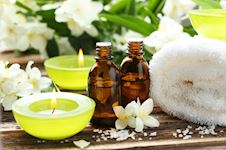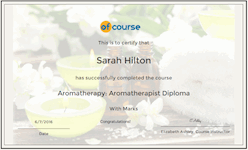Natural Therapies: Aromatherapy & Essential Oils Advanced
OfCourse
Summary
- Certificate of completion - Free
- Tutor is available to students
Add to basket or enquire
Overview
This Aromatherapy course is designed to attract beginner aromatherapists and will teach you how to use important equipment and which combination of essential oils create the best smelling bathing & massage oils, creams and candles. These easy to follow lectures will teach you the aromatherapy basics and show you how to make creams, oils and candles as the perfect self pampering idea or a gift.
Course media
Description
Course Highlights
- Learn basic oil mixtures to create the best scents to aid massage & relaxation
- Understand the most effective apparatus and how to use this equipment
- Safety guidelines to ensure that you are creating safe mixtures
- Develop your skills and learn how to create candles, creams and bathing & massage oils
- 6 quizzes to test your knowledge throughout the course
Course Overview
This course will teach how essential oils are produced and how best to mix them to create the best smelling aroma’s. It will offer guidance as to which oils mix well and some safety guidelines for those unsure about mixing various oils. You learn how to develop your essential oil mixing skills into practical gifts and self-pampering products.
Instructor Bio
Elizabeth Ashley has the created the perfect course for anyone wanting to learn aromatherapy for the first time or those at a more advanced level wishing to learn about various potions and scents that will aid massage & relaxation. Elizabeth covers everything from the safety guidelines associated with aromatherapy to which essential oils mix best and how to develop these mixtures into bathing oils, creams and candles.
Course Curriculum
What is an essential Oil?
- Introduction
- Flashcards - Lavender
- Lavender Part 1
- Lavender Part 2
- Lavender Part 3
- Flashcards-Camomiles
- Camomile Part 1
- Camomile Part 2
- What is an essential Oil? Flashcards
- What is an essential oil? Part 1
- What is an essential oil? Part 2
- Aroma Part 1
- Aroma Part 2
How to use an evaporator and dilution rules
- Extraction Part 1
- Extraction Part 2
- Extraction Part 3
- Extraction Carriers
- Rose Part 1
- Rose Part 2
- Rose Part 3
- Rose Part 4
- Rose Part 5
- Geranium
- Flashcards for Rose & Geranium
Chemistry & Essential Bath Oils
- Chemistry Part 1
- Chemistry Part 2
- Chemistry Part 3
- Chemistry Part 4
- Chemistry Part 5
- Chemistry Part 6
- Chemistry Part 7
- Chemistry Part 8
- Chemistry Part 9
- Flashcard Myrrh
- Myrrh Part 1
- Myrrh Part 2
- Myrrh Part 3
- Myrrh Part 4
- Myrrh Part 5
- Ylang ylang Part 1
- Ylang ylang Part 2
Dillution & How to make bath oils
- Dilution
- Flashcards for Jasmine and Patchouli
- Jasmine Part 1
- Jasmine Part 2
- Jasmine Part 3
- Jasmine Part 4
- Patchouli Part 1
- Patchouli Part 2
Blending & Making massage oils
- Blending Part 1
- Blending Part 2
- Intro
- Clary Sage Part 1
- Clary Sage Part 2
- Flashcards - Clary Sage
- Basil
- Sweet Basil
- Flashcards - Sweet Basil
The Limbic System & Making a Candle
- Limbic Part 1
- Limbic Part 2
- Limbic Part 3
- Limbic Part 4
- Frankincense Part 1
- Frankincense Part 2
- Flashcards - Frankincense
- Marigold Part 1
- Marigold Part 2
- Flashcards - Marigold
Creating Your First Kit & Making a Cream
- The Kit Part 1
- The Kit Part 2
- Eucalyptus Part 1
- Eucalyptus Part 2
- Tea Tree Part 1
- Tea Tree Part 2
Conclusion and What's Next?
- Safety Part 1
- Safety Part 2
- Safety Part 3
- Safety Part 4
- Practical Applications Part 1
- Practical Applications Part 2
- Practical Applications Part 3
- Practical Applications Part 4
- Practical Applications Part 5
- Practical Applications Part 6
- Practical Applications Part 7
- Extra Resources
- Conclusion
Quiz
- Part 1 - What is an Essential Oil?
- Part 2 - Evaporator and Dilution Rules
- Part 3 - Chemistry and Bath OIls
- Part 4 - Dilution and Bath Oils
- Part 5 - Blending & Making Massage Oils
- Part 6 - Limbic System and Making a Candle
- Part 7 - Concluding Quiz
Why Choose OfCourse Learning?
- All courses are taught by verified experts
- Students enjoy 24/7 access to their courses
- Courses can be accessed on any device
- Students get lifetime access to their courses so they can work at their own pace
- On completion, students receive a course certificate from a recognised educational institution
- Become a part of a global learning community where you can talk with teachers and students about the course
Who is this course for?
- Both beginner level aromatherapists and those looking to develop their understanding of the art
- Those wanting to relax using homemade, natural products
- Anyone interested in working with natural products
- Holistic practitioners
Requirements
All Levels Welcome.
Certificates
Certificate of completion
Digital certificate - Included
Reviews
Legal information
This course is advertised on reed.co.uk by the Course Provider, whose terms and conditions apply. Purchases are made directly from the Course Provider, and as such, content and materials are supplied by the Course Provider directly. Reed is acting as agent and not reseller in relation to this course. Reed's only responsibility is to facilitate your payment for the course. It is your responsibility to review and agree to the Course Provider's terms and conditions and satisfy yourself as to the suitability of the course you intend to purchase. Reed will not have any responsibility for the content of the course and/or associated materials.



